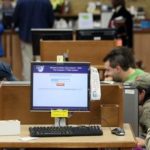Launching his Conservative party’s campaign for local elections in May, Mr Johnson said his government’s mass vaccination drive and pro-business policies would hasten economic recovery, “jab by jab, job by job”.Wales became the first UK nation to lift travel restrictions on Saturday, since the latest round of curbs took hold to combat a deadly second wave of COVID-19 over winter.From Monday, England’s stay-at-home order will also be relaxed to enable groups of up to six people to meet outside. The government plans to allow outdoors drinking in pub gardens, and non-essential retail such as hairdressers, from April 12.Mr Johnson conceded that a third wave of COVID-19 was sweeping Europe and could well hit Britain in about three weeks.But the “key difference” to last year was that any rise in infections and hospitalisations should be “sufficiently mitigated” by the vaccine rollout.“And as things stand, I can see absolutely nothing in the data to dissuade me from continuing along our road map to freedom, unlocking our economy and getting back to the life we love,” he told a virtual Conservative event.The mop-haired prime minister added: “In just a few days’ time, I’m finally going to be able to go to the barbers.“But more important than that, I’m going to be able to go down the street and cautiously, but irreversibly, I’m going to drink a pint of beer in the pub.”Britain’s vaccination drive has now given at least a first dose to more than 29 million adults, and the government plans to complete the phase by the end of July.But it remains on guard against more infectious coronavirus variants, such as ones that emerged in Brazil and South Africa.Vaccines minister Nadhim Zahawi told The Telegraph newspaper that the government could start delivering new booster doses in September for priority groups, including the over-70s and health workers.He said ministers were expecting up to eight vaccines to be available by the autumn — up from two currently on offer in the UK — including one that could protect against three different variants in a single jab.MORE OF EU, ASIA IN LOCKDOWNPoland has shut kindergartens, sports facilities and more non-essential shops and Prime Minister Mateusz Morawiecki urged Poles to spend Easter at home with their immediate families.Belgium has limited access to non-medical services such as hairdressers for four weeks, and customers can only visit stores selling “non-essential” items such as clothing and books by appointment.Next week, the last before Easter, only primary schools will remain open. The Philippines announced on Saturday that more than 24 million people in and around Manila will go into lockdown next week, as hospitals in the capital struggle to cope with a surge in coronavirus infections.The tougher restrictions in the country’s economic heartland — which accounts for about a fifth of the population — come as more contagious variants of the virus fuel a resurgence in cases.The week-long rules announced by presidential spokesman Harry Roque apply to Metro Manila and four surrounding provinces, which have already been placed in a travel bubble to try to prevent the spike spreading further.“The virus is the enemy, not the government,” Mr Roque said.“While we’re at home we expect the infection rates to slow.”People will have to work from home unless they are considered essential workers, and public transport will be halted.All mass gatherings will be banned, night-time curfews from 6:00pm to 5:00am will be enforced and non-essential businesses will be shut.New infections hit 9,595 on Saturday — the second highest for a single day since the start of the pandemic — taking the country’s caseload to more than 712,000.SACHIN TENDULKAR TESTS POSITIVEIndian cricket icon Sachin Tendulkar has revealed he has tested positive to COVID-19.The popular global sporting icon shared the news on Twitter on Saturday, saying he was experiencing “mild symptoms”.“I have been testing myself and taking all the recommended precautions to ensure COVID is kept at bay,” he tweeted.“However, I’ve tested positive today following mild symptoms. All others at home have tested negative.“I’ve quarantined myself at home and am following all the necessary protocols as advised by my doctors.“I want to thank all the healthcare professionals who are supporting me and many others across the country.“Take care all of you.”Last year, Tendulkar played in the Bushfire Bash charity match in Melbourne.UK’S FUTURE COVID RESTRICTION OUTLOOK The UK could be dealing with COVID-related health restrictions for the next decade, with face masks and social distancing set to become ‘the new [long-term] norm’.The Sun reports, ex-Supreme Court judge Lord Jonathan Sumption says restrictions put in place to help prevent the spread of COVID-19 could last as long as rationing did in Britain after the Second World War.Speaking on the Sketch Notes, a Pandemic podcast from the Sunday Express, Lord Sumption said it was “politically unrealistic” to expect the UK Government to backtrack on social restrictions anytime soon.He said Brits had taken comfort in moves on public behaviour because it helped them to feel safe. He then drew parallels with food rationing that continued well after the fall of the Nazis in 1945.“People were in favour of that because they were in favour of social control,” he said.However Lord Sumption also pointed out the British people eventually tied of post-war rationing and expected the same to happen with health restrictions this time around.The UK’s former top scientist, Professor Neil Ferguson, whose early modelling played a key role in the first lockdown before he stood down after breaking COVID rules, also said restrictions wouldn’t end soon.“There will be new things we can’t predict precisely, like the waning of immunity, like new variants coming up, which means there will be some residual need to maintain some social distancing, mask wearing, probably for much of this year,” he said.VACCINE ROLLOUT HITS 500M JABSAn AFP tally of global vaccinations showed more than 508 million had been administered by Friday, with 133 million in the US and 91 million in India.With more than 2.7 million people dead from a virus that first emerged in China in late 2019, leaders everywhere are under pressure to get jabs into arms.But infections continue to rise at a worrying rate, with more than half a million cases recorded worldwide in just the last week, according to AFP data.Despite the huge effort to get jabs into arms, the pandemic is still surging in Europe and in other parts of the world, especially Latin America.And the rollout of vaccines is chronically unequal, with the United States accounting for more than a quarter of the global total and poorer nations lagging far behind richer ones.EU countries are also still struggling to get their inoculation drives off the ground, prompting angry outbursts from the top of French officialdom.Following an EU summit, French President Emmanuel Macron said there was a “new type of world war”, adding: “We are looking in particular at Russian and Chinese attacks and attempts to gain influence through the vaccine.” His foreign minister, Jean-Yves Le Drian, later chimed in to accuse Britain of “blackmail” in its vaccine dealings with the EU.However, Moscow — whose Sputnik V shot is being rolled out in numerous countries across the world — quickly rebuffed Mr Macron’s outburst, Kremlin officials saying they “absolutely disagree”.And in a sign of Europe’s deepening divisions, Germany said it would be happy to use Sputnik V if it gets approval from EU regulators.Germany also said it has classified France as a high-risk zone, which means travellers need to show a negative COVID test and quarantine upon arrival.EU AGENCY APPROVES ASTRAZENECA PLANT CAUGHT IN UK ROW The EU’s drug watchdog gave the green light on Friday local time to the Dutch Halix factory to produce AstraZeneca’s coronavirus vaccine, which has been at the heart of a bitter dispute with Britain.The European Medicines Agency (EMA) also granted approval to a Pfizer/BioNTech plant in Marburg, Germany and a manufacturing site for the Moderna vaccine in Switzerland.Brussels has threatened to block exports to the UK from the Halix plant in Leiden in the Netherlands until drugs giant AstraZeneca makes good on its promised vaccine deliveries to the bloc.“A new manufacturing site has been approved for the production of AstraZeneca’s COVID-19 vaccine active substance,” the Amsterdam-based EMA said in a statement.The Halix site is located in Leiden, the Netherlands, and will bring the total number of manufacturing sites licensed for the production of the active substance of the vaccine to four. EU Health Commissioner Stella Kyriakides told AFP that the new vaccines would be delivered from the AstraZeneca plant within days following the EMA decision.She said it had been made under an “accelerated” process.“We now expect that vaccines produced by this plant will be delivered to EU member states in the coming days as part of the contractual obligation and commitment made by AstraZeneca to European citizens,” she said in a statement sent to AFP.The Dutch plant has been at the centre of a furious row, with Prime Minister Boris Johnson’s government claiming it as part of the British vaccine supply chain.However EU chief Ursula von der Leyen warned on Thursday that it will ban firms including AstraZeneca from exporting vaccines to other countries until they meet their commitments to the bloc.Dr FAUCI REFUTES WUHAN LAB THEORYUS infectious diseases expert Dr. Anthony Fauci on Friday blew off claims from former Centers for Disease Control and Prevention Director Dr. Robert Redfield that SARS-CoV-2 was created in a Chinese lab, saying Dr. Redfield was merely expressing an “opinion.”During the White House coronavirus briefing, Dr. Fauci said the virus that causes COVID-19 was probably already spreading in China weeks before it was detected — which helped it become more contagious.“The alternative explanation … is that this virus was actually circulating in China, likely in Wuhan, for a month or more before they were clinically recognised at the end of December 2019,” Dr. Fauci explained. “If that were the case, the virus clearly could’ve adapted itself to a greater efficiency of transmissibility over that period of time up to and at the time it was recognised.”In a new interview with CNN on Friday, Dr. Redfield — who oversaw the CDC at the peak of the deadly global pandemic — said it was his “opinion” as a top virologist that SARS-CoV-2 “escaped” from the laboratory in Wuhan.The origins of the highly contagious bug are widely accepted to have come from animals before it adapted to humans.But Dr. Redfield said if that were the case, “it takes a while for it to figure out how to become more and more efficient in human-to-human transmission.”“I just don’t think this makes biological sense,” he added.“I am of the point of view that I still think the most likely aetiology of this pathogen in Wuhan was from a laboratory, escaped,” said Dr. Redfield.“Other people don’t believe that. That’s fine — science will eventually figure it out. It’s not unusual for respiratory pathogens that are being worked on in a laboratory to infect a laboratory worker.”Dr Fauci reiterated Dr. Redfield’s comments that he was only floating a theory.“So Dr. Redfield was mentioning that he was giving an opinion to a possibility,” Dr. Fauci said, “but again, there are other alternatives, others that most people hold by.”Asked to also weigh in, current CDC Director Rochelle Walensky said a report from the World Health Organisation about the origins of COVID-19 is forthcoming.ITALY SUFFERED HIGHEST DEATHS SINCE WWIIItaly suffered its highest number of deaths since World War II last year due to the coronavirus pandemic, with over 100,000 deaths more than average, according to new figures Friday.“The demographic picture of our country has undergone a profound change because of the impact of COVID-19 deaths,” national statistic agency Istat said in a new report.“In 2020, total deaths reached 746,146, the highest number ever recorded since World War II, with an increase on the 2015-2019 average of more than 100,000 (+ 15.6 per cent).” Daily updated health ministry data on the number of people with COVID-19 who have died since the pandemic put the toll at 74,000 by December 31, 2020.Istat did not account for the discrepancy between the two figures. The total number of COVID-19-related deaths has now reached more than 100,0000 as Italy — the first European country to face the full force of the pandemic 13 months ago — faces a fresh wave of infections.The Istat figures show Italy’s northern regions, which were hit first and hardest, have suffered the biggest increases in so-called excess deaths.Alongside these grim figures came a record low in the number of births — at 404,104, down 3.8 per cent from 2019 — accelerating a trend towards a declining population.“The new record low number of births (404,000) and the high number of deaths (746,000), never experienced since the Second World War, accelerate the negative natural dynamic that characterises our country,” Istat saidBRAZIL’S COVID TOLL: THE ‘BIGGEST GENOCIDE’Vaccines cannot come quickly enough to Brazil, which is suffering unsparingly from an outbreak that has now killed more than 300,000 from 12 million infections.The political heat was turned up on President Jair Bolsonaro on Friday when his predecessor accused him of presiding over the “biggest genocide” in the country’s history.“We must save Brazil from COVID-19,” said former leader Luiz Inacio Lula da Silva, adding: “Brazil will not withstand it if this man continues to govern in this way.” Further north, Mexico is also suffering a brutal third wave, with only a tiny proportion of the population vaccinated so far.Adriana Meneses remembers vividly when her husband Carlos Hernandez became the country’s first victim of an illness that was unknown and apparently untreatable, almost exactly one year ago.“We were harassed by the neighbours and on social networks. They threatened to burn down our house,” she said.“Today, unfortunately, we are part of the statistics.”UK ACCUSED OF BLACKMAIL OVER EU JAB DELIVERIESFrance’s foreign minister has accused Britain of “blackmail” against the European Union over COVID-19 vaccine deliveries, saying the UK was under pressure because it lacked doses for second vaccine shots.“The United Kingdom has taken great pride in vaccinating well with the first dose except they have a problem with the second dose,” Jean-Yves Le Drian told France Info radio.“You are vaccinated when you have had both doses. Today there are as many people vaccinated with both in France as the United Kingdom,” he added, while calling for a “co-operation agreement” with London over deliveries by pharma group AstraZeneca.“You can’t be playing like this, a bit of blackmail, just because you hurried to get people vaccinated with a first shot, and now you’re a bit handicapped because you don’t have the second one,” he added.The latest EU-UK row is about an AstraZeneca plant in the Netherlands, which Prime Minister Boris Johnson’s government claims as part of the British vaccine supply chain.The European Union warned it would ban drugs firms from exporting coronavirus vaccines to the UK and other well-supplied countries until they make good on their promised deliveries to the bloc.EU chief Ursula von der Leyen’s stark warning – which could hit UK-based AstraZeneca first – came after a video summit of all 27 EU leaders and stoked fears that cross-Channel rivalry could damage global efforts to combat the pandemic.According to data compiled by AFP, Britain has administered two vaccine doses to 4.1 per cent of its population, against 3.9 per cent overall in France.France accused Russia of using its Sputnik V COVID-19 vaccine as a tool to spread Moscow’s influence and message rather than as way to fight the global health crisis.“In terms of how it is managed, it (the Sputnik V vaccine) is more a means of propaganda and aggressive diplomacy than a means of solidarity and health aid,” Le Drian said.The Russian vaccine has come under much criticism in Western countries, while President Vladimir Putin – who got a Sputnik jab himself on Tuesday – has dismissed the scepticism as “strange”.Le Drian said both Russia and China were using their vaccines to gain influence abroad “even before vaccinating their own populations”.The minister said Russia had announced “with a lot of media attention” that it would deliver 30,000 vaccine doses to Tunisia. But the UN-backed Covax initiative had already delivered 100,000 doses to the North African country, with 400,000 more to come by May, he said.“That is what real solidarity work looks like, that is true health co-operation,” Le Drian said.Russia registered Sputnik V in August, ahead of large-scale clinical trials, prompting worries among many experts over the fast-track process.Later reviews have been largely positive, with leading medical journal The Lancet publishing results showing it is safe and more than 90 per cent effective. The European Medicines Agency this month launched a rolling review of Sputnik V, a key step towards it being approved as the first non-Western coronavirus jab to be used across the 27-nation bloc.Meanwhile, Germany has ratified an enormous 750 billion euro ($A1160 billion) EU coronavirus recovery fund, breaking its taboos against debt pooling among members of the bloc to drag the continent back onto the path of growth.After the lower house of parliament approved the fund on Thursday, the upper house Bundesrat greenlit it on FridayCOVID-19 World NumbersTOKYO ENJOYS CHERRY BLOSSOMS DESPITE WARNINGPeople in Tokyo flocked to admire cherry blossoms in full bloom at parks, shrines and rivers on Friday, despite coronavirus warnings against holding traditional parties under the delicate flowers.Annual festivals have been cancelled, fluorescent tape used to cordon off picnic spots, and signs put up urging people to “refrain from gathering to enjoy the cherry blossoms”.But many people, mostly wearing masks, decided to make the most of clear blue skies to snap “sakura” selfies, stroll down blossom-lined paths or take boat rides under the pink-and-white blooms.Despite a third wave of COVID-19 infections over the winter, Japan has had a comparatively small outbreak overall with around 9000 deaths and has not imposed the blanket lockdowns seen in other countries.The Japanese government this week lifted a virus state of emergency in the Tokyo area but city governor Yuriko Koike has warned residents to “avoid cherry blossom viewing parties” to prevent a resurgence of the disease.The number of coronavirus cases in Tokyo is gradually rising, with 394 new infections recorded on Thursday.“We fear there may be a sudden spread of infections – bigger than the third wave – if the number of people going out increases, as it does each year with cherry blossom viewing, welcome parties (for new employees and students) and graduation trips,” said Norio Ohmagari, director of Japan’s Disease Control and Prevention Center, on Thursday.Japan’s sakura or cherry blossom season is feverishly anticipated by locals and visitors alike, although this year foreign tourists have been kept away by virus border restrictions.Cherry blossoms symbolise the fragility of life in Japanese culture as full blooms only last about a week before the petals start falling off trees.It is traditionally celebrated with hanami, or viewing parties, with picnics – and sometimes boozy festivities – organised beneath the trees.The season is also considered one of change as it marks the start of the new business year, with many university graduates starting their first full-time jobs and older colleagues shifting to new positions.
Powered by WPeMatico






